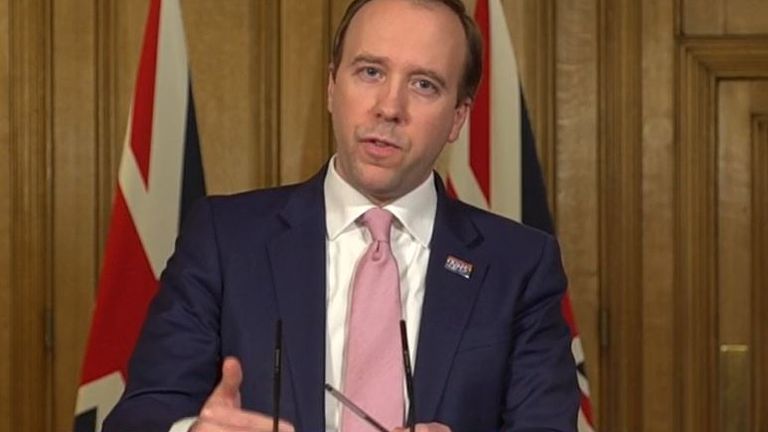Reduced numbers of vaccines are due to problems with international supplies, a government minister has suggested – but he insisted the issues would not slow down the easing of lockdown.
The NHS has warned of a month-long “significant reduction” in weekly supply of vaccines in a letter to local health leaders.
But Housing, Communities and Local Government Secretary Robert Jenrick stressed the UK remained on course to vaccinate the top nine priority groups – including all over-50s – by the middle of next month, as well as vaccinating all UK adults by the end of July.
“We always said right from the beginning that a new manufacturing process would have its lumps and bumps and that has been the case in the past and I’m sure it will be in the future,” he told Sky News.
“We’re sourcing vaccines from all over the world and we are experiencing, occasionally, some issues and that’s led to this issue with some supply in the coming weeks.
“But the main thing is we’re still very much on course, we’ve still got line of sight to deliver the vaccines and to meet our targets.”
Mr Jenrick said supply issues in the weeks ahead “isn’t anything people should be worried about”.
“Nobody who has an appointment should be concerned, you’re still going to get your second vaccine, all those appointments will be honoured,” he added.
Vaccine supplier Pfizer has said its deliveries to the UK for the first three months of the year “remain on track”.
And AstraZeneca has said its UK domestic supply chain “is not experiencing any disruption and there is no impact on our delivery schedule”.
Asked about reports that delays to the delivery of five million Oxford-AstraZeneca doses from India are behind the expected reduction in supply, Mr Jenrick said he would not comment on “the specific contracts we have with different manufacturers”.
But he added: “We’re sourcing vaccines from many countries all over the world, it’s a very complex international supply chain.
“That does mean occasionally we will experience issues and that is what we’ve experienced right now.”
The NHS letter to local health leaders across the country warns of a “significant reduction in weekly supply” from 29 March for a four-week period.
It added that “volumes for first doses will be significantly constrained”, with healthcare providers told those aged 49 and under should only be offered a vaccine in “exceptional circumstances” – such as if they are clinically vulnerable or a frontline care worker.
Subscribe to the Daily podcast on Apple Podcasts, Google Podcasts, Spotify, Spreaker
Vaccination centres were told to close unfilled bookings from 29 March onwards – and to ensure no further appointments are scheduled for the whole of April.
Under Prime Minister Boris Johnson’s roadmap for easing England’s lockdown, more socialising will be allowed at the end of this month before non-essential shops, hairdressers and gyms reopen on 12 April.
And Mr Jenrick said there was “no reason to believe the roadmap is affected by this temporary shortage in supply”.
“There’s no concern we’re off course with the roadmap,” he added.
The Pfizer and AstraZeneca jabs are currently the only two vaccines being used in the UK.
The government has also secured access to 17 million doses of a vaccine developed by Moderna, which has also been approved for use in the UK, but Mr Jenrick said he did not know the “exact date” it would begin to be used.
“Obviously we have the orders placed and we will using them as quickly as they come into the country,” he added.

